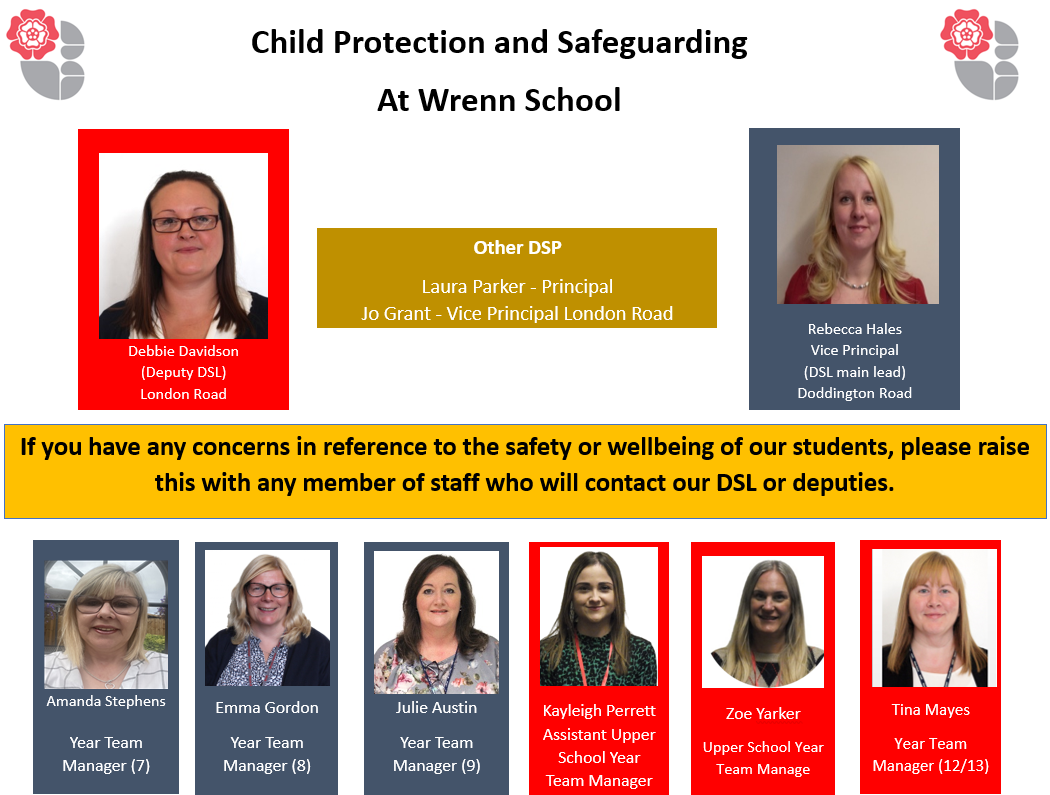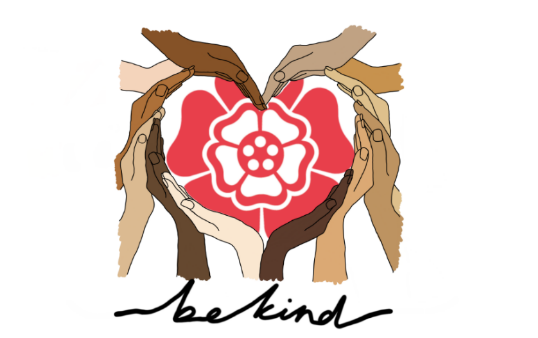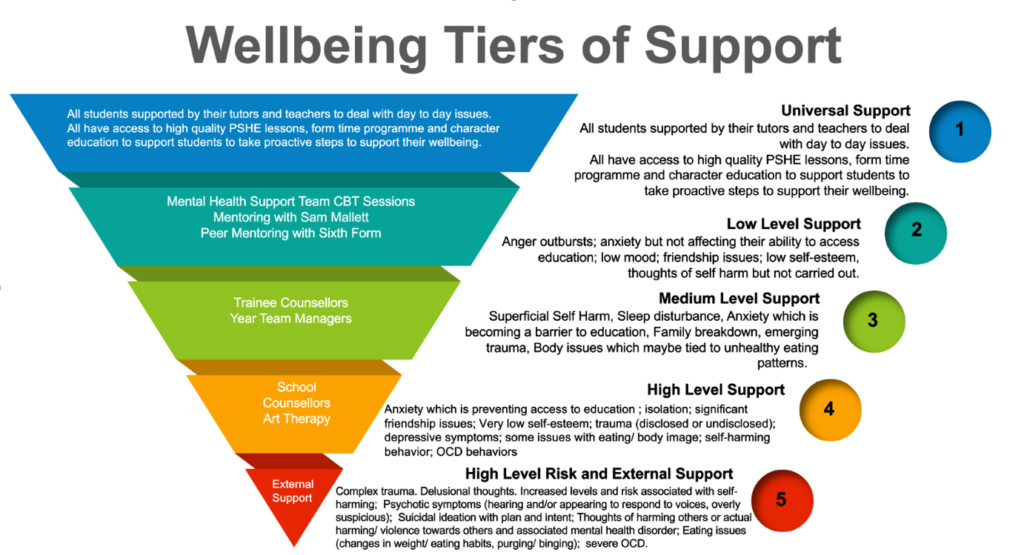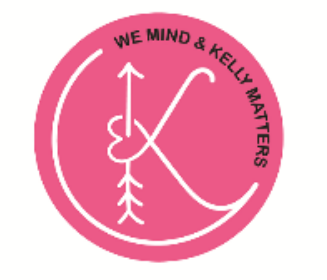Safeguarding
At Wrenn School, we are committed to safeguarding children and young people, and we expect everyone who works in our academy to share this commitment.

Adults in our academy take all welfare concerns seriously and encourage children and young people to talk to us about anything that worries them. We will always act in the best interest of the child.
| Role | Contact Details (Click to email) |
|---|---|
| Principal | Laura Parker |
| Designated Safeguarding Lead | Rebecca Hales – Vice Principal Tel: 07542 306212 |
| Deputy Designated Safeguarding Lead | Debbie Davidson – Attendance Improvement Manager – Tel: 07842 306203 |
| eSafety Lead | Terry Ekins – Network Manager |
| Prevent Duty Lead | Rebecca Hales – Vice Principal Tel: 07542 306212 |
| Designated Teacher with responsibility for Young Carers | Sarah Earl – Outdoor Education Lead |
| Designated Teacher for Looked After and Previously Looked After Children | Natasha Thomas-Francis |
| Nominated Safeguarding Governor | Roger Westcott |
The child protection policy is available to download or view here.
Bullying issues can also be anonymously reported via the Wrenn Student Voice site.
Respecting Others and Be Kind @ Wrenn
Respect is one of the core aspects of the Wrenn School ethos and students are encouraged at Wrenn to treat each other kindly at all times. This is reinforced through our PSHE curriculum, form time activities and our awards system. The culture within the school is welcoming and supportive. Our Anti Bullying Ambassadors in Lower School and Diversity Ambassadors in upper school, work with the student body to ensure all are respectful and bullying/discrimination is not tolerated. Students are encouraged to report any use of language which could be harmful to others through our Be Kind @ Wrenn reporting system. We also celebrate where our students are being kind to each other through both achievement points and awarding our BeKind@Wrenn badge to students who are exceptional in their respectful behaviour both in and outside of school. Our logo was designed by one of our students and is used to symbolise this important work.
We are proud to use our safeguarding website which is designed to gather cutting edge information about safeguarding at Wrenn School. Our students use it to give feedback on the many places in school they feel safe and areas of concern as well as gaining advice on all safeguarding issues. The students will also be able to see feedback from our student parliament using our "You said, we did" format. Click on the link below to access the website.
https://wrennschool.thestudentvoice.co.uk/
Mental Health Support
We are acutely aware of the impact of the pandemic on our young people’s mental health and therefore offer an extensive range of interventions to support when our students who are struggling. We use a referral process driven by our students voice to allocate the appropriate support. Please see our Tiers of Therapy document for information on all the services we offer in the school.

We are also proud to be a Mental Health Support Team school which means we work closely with the NHS to both quality assure our approach to mental health as well as offering some bespoke support for students with emerging needs. The Mental Health Support Team have delivered crucial staff training around spotting the signs of distress in young people and how to provide support.
We also have strong links with We Mind and Kelly Matters who are a local suicide prevention who have supported training our staff and have provided a bespoke package of support for Wrenn students online for out of hours care.

Child Criminal Exploitation
County lines is the name given to drug dealing where organised criminal groups (OCGs) use phone lines to move and supply drugs, usually from cities into smaller towns and rural areas. They exploit vulnerable people, including children and those with mental health or addiction issues, by recruiting them to distribute the drugs, often referred to as ‘drug running’.
Signs to look out for
There are several signs to look out for that may indicate someone is involved in county lines:
- repeatedly going missing from school or home and being found in other areas
- having money, new clothes or electronic devices and they can’t explain how they paid for them
- getting high numbers of texts or phone calls, being secretive about who they’re speaking to
- decline in school or work performance
- significant changes in emotional or physical well-being
- Ways OCGs use social media
- advertising drugs by sharing photos, videos
- statuses showing money, new drugs or when the dealer is open for business
- dealers sharing ‘stories’ to followers, using social platforms to expand their network with ‘suggested’ friends
- using hashtags linked to drugs
- using emojis as code for drug, violence and sexual activities, eg the snowflake emoji (for buying cocaine), 8-ball emoji (for buying an eighth of an ounce) or the rocket emoji (for purity of drugs)
County Lines Police Resources
Cuckooing
OCGs often use high levels of violence and intimidation to protect the ‘county line’ and control them. One of these forms of control exploits vulnerable people by using their home as a base for dealing drugs, a process known as cuckooing. Dealers often convince the vulnerable person to let their home be used for drug dealing by giving them free drugs or offering to pay for food or utilities.
Often OCGs target people who are lonely, isolated, or have addiction issues. It’s common for OCGs to use a property for a short amount of time, moving address frequently to reduce the chance of being caught.
There are several signs to look out for that may indicate someone is a victim of cuckooing:
- frequent visitors at unsociable hours
- changes in your neighbour’s daily routine
- unusual smells coming from a property
- suspicious or unfamiliar vehicles outside an address
Guidance and Support
For other support and advice the following organisations may also be of use: